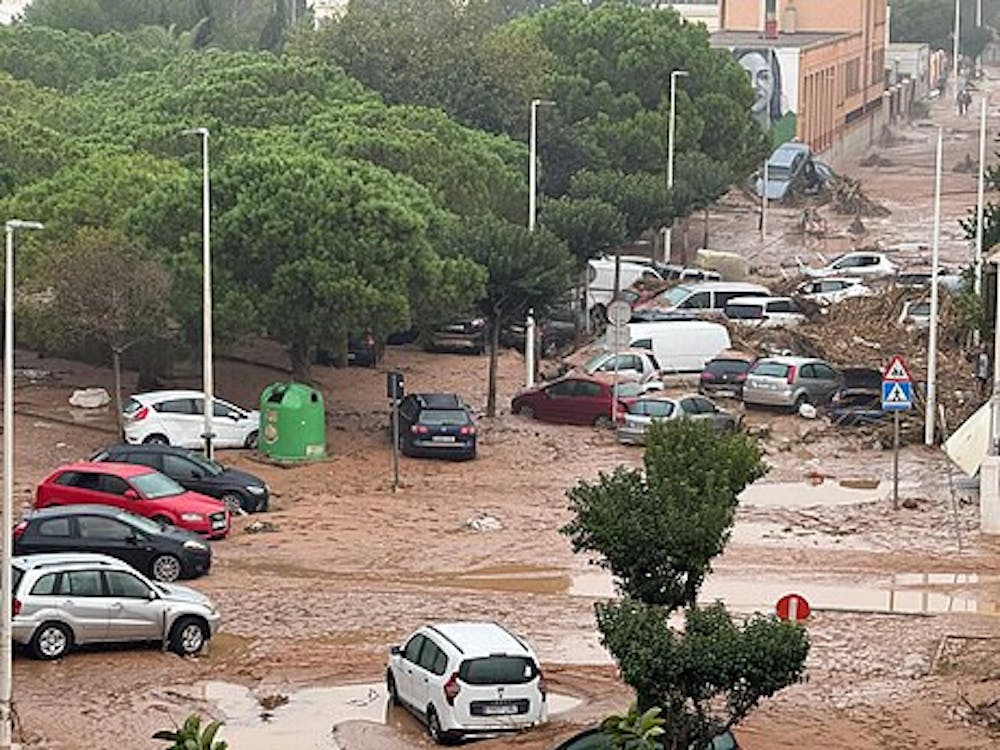Days of heavy flooding in the Valencia region of Spain led the University's study abroad program in the area to temporarily cancel classes, events and University-sponsored trips for most of last week. Although the flooding has been slowly decreasing in severity since the beginning of this week, it still poses a serious threat to the program’s daily operations and to local infrastructure.
The U.Va. in Valencia program, founded in 1983, is a study abroad experience for students interested in becoming well-versed in Spanish and Latin American culture and language. Students who have completed their first-year or transfer students who have completed one semester at the University may participate in the program, which runs throughout the academic year.
In response to the record-setting flooding that started at the end of October, program administrators in Charlottesville and Spain decided to cancel classes for students studying abroad in Valencia beginning Oct. 29 due to public transit and road flooding concerns. Classes resumed Monday.
According to Dudley Doane, Director of the International Studies Office that supervises all of the University’s study abroad programs, disruptions in public and private transportation due to the flooding was the primary reason why the program temporarily canceled classes.
“Because of disruptions in public transportation early last week, U.Va. in Valencia classes had been canceled for most of the week,” Doane said.
However, the lack of a continued threat to the city of Valencia’s public infrastructure and services as described by Doane was key in the program’s decision to later resume classes.
The study abroad program follows the US State Department’s advisory warnings, while also having its own Health and Safety Abroad Guidelines. Since weather conditions dropped in severity this week, neither the State Department nor the program’s own guidelines restricted travel into or around Eastern Spain, allowing for regular activities to continue.
One of these activities was classes, which resumed Monday of this week. Doane said that while the flooding remains a concern to the study abroad program, there are no plans to cancel any future classes or events at the present time. He said that he and other administrators will continue to monitor the current weather conditions across Eastern Spain as the situation progresses.
While regular classes have resumed, many students are now unable to leave the immediate area surrounding Valencia to their scheduled personal trips and commitments in different parts of the country.
Without easy access to major transportation networks — like the A-3 highway running through Valencia and local roads running across rural Spain — it has been difficult for some to move or communicate, especially in the region’s most rural and remote areas.
Third-year College student Colin Knaupp said he had planned on traveling from Valencia to Barcelona by train last weekend, but that the flooding forced him to change his mode of transportation at the last minute.
“I called the train station, but all the trains were just not running indefinitely,” said Knaupp. “There was no notice of when they were going to be back, so I took a last minute bus for the entire trip. It's just been very difficult and chaotic.”
To that extent, rural communities and residents have criticized the government’s delayed response. These areas, already lacking adequate infrastructure, have suffered severe damage to roads, homes and farm equipment, with significant property loss and some fatalities.
The Spanish government’s handling of the crisis in rural areas has sparked public outrage, with some blaming national leaders, including the King, Queen and Prime Minister, for 217 people who have died from the flooding so far.
Nevertheless, weather conditions have been slowly improving across the country as more and more lines of transportation and communication reopen to the general public. University students in particular should expect to see things return to normal as the rain begins to soften and the floodwaters begin to recede, according to Doane.
The recovery process in Spain will take a significant amount of time according to local officials, since much of the damage has affected critical infrastructure, homes and livelihoods. Roads have been washed out, neighborhoods remain submerged, and countless families face the daunting task of rebuilding from scratch.
The Spanish government and aid organizations are mobilizing resources to provide immediate relief, but full restoration of affected areas will likely require years of sustained effort, funding and support.







